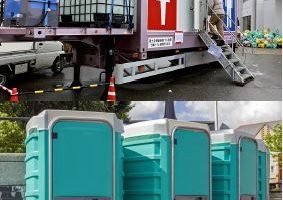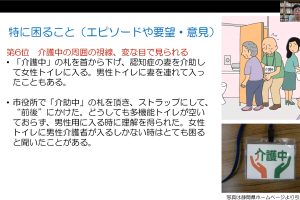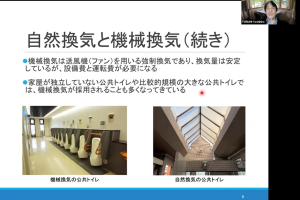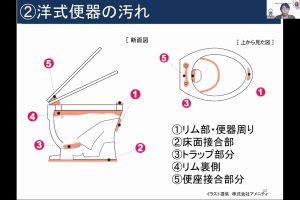The 26th seminar
“Even men require a litter bin in the toilet !” – Part3
– Let’s talk about excretion problems
Date: 20 July 2023 (Thu) 18:00-20:00 JST
Master of Ceremony (MC); Mikiko Takahashi,Ph.D. (Director of JTA, Manager of R&D Division of Comany Inc.)
Presenters:
Presenter 1; Mr. Naoki Asai (Executive Director, General Incorporated Association Shigen Cafe Systems)
Presenter 2; Mr. Hokusai Katsushika (Pseudonym, Senyu club)
Presenter 3; Mr. Yoji Kawasaki (NPO AWA Cancer Prevention Fund, PSA Hokkaido)
Presenter 4; Mr. Taro Tora (JTA Steering Committee Member, Former Director and Managing Executive Officer of Nikken Rental Co., Ltd.)
Presenter 5; Mr. Kohei Yamamoto (JTA Steering Committee Member, Representative of the Disaster and Temporary Toilet Study Group in JTA, Chairman and Director of Dynax Urban Environment Research Institute Co., Ltd.)
(Takahashi) Today is the third seminar of “Even men require a litter bin in the toilet !” We would like to hear from people who actually have the excretion problems.
The first seminar was held in February 2022. The presenter suggested a sanitary box must be set in the men’s cubicle as well. The second one was held in July 2022. We introduced the results of two surveys on the sanitary boxes by the Japan Toilet Association (JTA).
The first survey in February 2022 focused on members of JTA. How many people actually have problems with the excretion? We conducted a survey asking whether such people had ever experienced any trouble due to the lack of the sanitary boxes in the men’s cubicle.
The second survey applied an online questionnaire from June to December 2022. We asked those who have the excretion problems what kind of problems they have when going out and about the requirements for the sanitary boxes.
We asked how many people in each age group were using the incontinence pads or diapers due to the urinary and defecation problems in the first survey. The result was 16.7% for those in their 40 years, 22.1% for over 60 years, and 27.1% for over 70 years. As people get older, the user of the incontinence pads and diapers increases. 68.4% men with the excretion problems said they experienced trouble because there was no sanitary box in the men’s cubicle.
Then we asked about specific problems in the second survey.
Approximately 50% of both men and women answered they had refrained from going out because they had problems with the excretion. We heard about the kinds of troubles faced by people who use the absorbent materials, such as pants, pads, diapers, sanitary products, and ostomate products when they go out. 64.1% of men replied that they cannot find a place to throw them away. This was the top problem for men, while 22.1% of women. It showed it was a less serious problem. This may be due to the fact that there are usually the sanitary boxes in the women’s cubicle, while there is not in men’s one.
We asked in the questionnaire about the functions they wanted in a sanitary box. Many of the responses required the size being sufficient, no odors leaking out, and being able to be thrown away without touching the sanitary box.
It was concluded that we must consider its management and operation and decide its size and location when putting a sanitary box in the toilet.
(1) Self-introductions
1.1 Tora
In my case, the paraffin was flowing out of my anus due to overuse of the painkiller suppositories. I have been used the women’s napkins for five or six years. At that time, I learned that Mr. Kohei Yamamoto who is also one of the today’s presenters, also suffered from the urinary incontinence. We are carrying out fact-finding and awareness-raising activities about this issue.
1.2 Asai
I was in charge of the environment and garbage at Chishima City government in Aichi prefecture for a long time and now retired. I thought that the project of local governments collecting resources from households might not continue since the local governments’ finances are decreasing due to the declining birthrate and increasing the aging population. Then we started General Incorporated Association Shigen Cafe Systems aiming to create a system where the private sector, rather than the local government will recycle household resources.
I got a surgery for the prostate cancer at the end of January this year (2023) and experienced the urinate leakage. The fact that I cannot control my bowel was truly a shock that it almost neglects my dignity. I recognized after the operation, there were many people around me having same troubles with the urinate incontinence.
Some people with the urinate leakage gave up going out and socializing with the friends and only stayed home. I also felt like I didn’t want to go out or walk. I experienced at the beginning that the pad would quickly overflow and wet my underwear and trousers. A trouble when I go out was that there was no place to throw away the pads or to change clothes. Whenever I went out, I cared whether there was a sanitary box in the toilet or not. I feel guilty about occupying a wheelchair-accessible toilet cubicle.
In my case, the volume to throw away is too large quantity and a regular sanitary box is too small when I use the paper pants. I was a civil servant and an officer of a local labour union. Then I surveyed whether there were sanitary boxes in the toilets of each city hall in Aichi Prefecture and how they were labeled.
1.3 Kawasaki
I have two affiliations. One is AWA cancer countermeasures fund. This centre supports cancer patients with raising the awareness in the community.
The other is Prostate Specific Antigen (PSA) Hokkaido. This is a group with the prostate cancer patients and their families. The members can receive consultations and exchange information about urinate absorbing pads and urinate leakage issues. I have stage 4 prostate cancer, and it has been 11 years after onset of symptoms. I am using the pads almost every day for the past 4-5 years.
1.4 Yamamoto
I underwent surgery for the spinal stenosis about three years ago. I was in a very serious condition and had trouble urinating before the surgery. The front of my trousers would often get wet due to a little leakage. I bought a pad at a drugstore when I was on a business trip and tried wearing it for the first time. The problem was that I could not easily find a place to throw it away and this really quite bothered me.
The men’s urinate incontinence prevention products are not displayed in the conspicuous places at the drugstores. Most of them were on the shelf in the adult diaper section. There are few introductions even on industry websites about the incontinence pads for men. The Sanitary Materials Industry Association respond not swiftly when I contacted. On the other hand, I think if there were more places to easily dispose of them, more people would use the pads.
1.5 Takahashi
I think less people are aware of the existence of the incontinence pads for men. The women’s incontinence pads are lined up next to the sanitary products at the drugstores, but men’s pads are currently only available in small numbers in the nursing care products section such as the diapers.
We found in our survey that among people with the urinate problems, fewer men than more women used the incontinence pads. I think there may be a reason that men feel embarrassed purchase it. However, I think that the product called the incontinence pad is not well known by many people.
1.6 Katsushika
I started urinating little by little after I got a surgery for the prostate cancer in 2016. I always use a urinate pad as sometimes I cannot notice when it leaked. I tried to go to the toilet more often, but the leaked volume has increased and one 10cc pad for a day is no longer enough.
I keep the replacement pads in my bag and change them in the toilet when I go out. I can’t imagine of a place where the sanitary boxes are always placed. The only way is to throw it in the litter when there is no sanitary box. I get worried about the smell when I carry it around.
The incontinence pad may shift the position as moving around my body. It would be a problem if the leakage spread to my trousers without my recognizing. I used to wear the trousers in dark colours that won’t make leaks as noticeable as possible. I feel difficult to buy the incontinence pads for men as they are often found in the diaper and welfare equipment sections at the drugstores.
Women can talk about the urinate leakage quite openly, but men are concerned about his dignity and feel it hard to talk about it. That is why I’m naming a pseudonym today. It’s not just about the urinated incontinence but also to talk about the cancer. There are many women but a few men at those meetings. I use the cubicle when I need to reposition the incontinence pad, but will use the urinal when it is easier.
I think this situation is different for each person. I don’t use wheelchair-accessible toilets because I have heard someone use them without a wheelchair and criticized by the others. I wish the sanitary boxes to be always placed in the public toilets.
I wish a sanitary box that without touching when disposing and that a user cannot see what the previous user’s ones. Finally, I think men should talk more openly about this matter.
(2) Discussion
(Kawasaki) The biggest problem is that there are not many sanitary boxes. I prepare a sealable plastic bag and take it home when I cannot find a place to throw it away. The men’s pad section at the drugstore is usually located in an inconspicuous place and what is more there are only limited numbers.
In my case, I need small volume ones of either 20cc or 40cc which are often out of stock. Whenever I ask the store staff, they often answer they don’t know when the product will be delivered next time. I wish to select a variety of products with the prices under competition. Also, I wish the quality improvements made not shift the position easily when I wore.
(Asai) My predecessors who use the incontinence pads told me not to expect there are some places where I can throw it away. I was also advised to carry always a bag and a plastic bag for my used one, and go to the toilet at least once an hour.
I throw away the used pads sealed in a plastic bag. Normally, the disposable diapers and incontinence pads are waterproofed and it has water retention properties. I don’t think they will leak without putting it in a plastic bag.
The litter bins are placed in the multifunctional toilets. However, some have signs saying “Please do not put the disposable diapers in.” I think many wheelchair users often use diapers and it must be hard to find a place to throw them away.
I think men should start to be aware of the urinate leakage in their 40s and 50s, even if they don’t have diseases such as a prostate or bladder cancer. We need to change the consciousness of society as a whole by treating them as something familiar to us rather than shunning things as filth matter. I think that understanding of men’s own urinate incontinence is gradually common, then this must affect the product types and drugstore displays.
All convenience stores in my neighborhood have toilets similar to the multifunctional toilets with the sanitary box although in a rural area where I am living. Whereabout, there are still some hospitals do not set the sanitary boxes.
(Takahashi) Which facilities would you like to set the sanitary boxes in the toilets?
(Kawasaki) What I especially want is in hospitals. It is a place that the patients go and I’m sure there must be the patients with the problem of the leaking urine. Next one is in the local government buildings.
(Tora) All multifunctional toilets in the shopping centres are now commonly setting with the sanitary boxes, but the men’s toilets are partially set on a trial basis. It depends on the owner’s decision. A large electronics retailer has announced on its website that the sanitary boxes will be set in the men’s toilet at all their stores in Japan. Major shopping malls are also on setting, but there is different pace between directly managed stores and tenant ones.
The setting of them are gradually expanding in other locations as well.
(Takahashi) How did you manage it when you cannot find a sanitary box?
(Tora) I travelled around a lot, and the only places I sojourned were the trains, planes and offices, and it was hard to find a place to throw it away. When the multifunctional toilet was empty, I would go in and throw it away. I used to curry a slightly larger bag to hold both unused and used pads.
At first, I used a women’s napkin, but it fell out of my trousers due to sweating. Then I leaned I must change it regularly. In fact, my biggest problem was to find a place to throw it away.
I often travelled and I wish firstly to set it at the stations. They must consider the balance between the risk management such as counter-terrorism measures and the user’s requests. I think there must be a better solution. There are many reasons why a sanitary box cannot be set. For example, there are concerns about fires caused by the discarded cigarettes. The private building management companies are often reluctant to set them.
(Takahashi) I am working to set sanitary boxes in the men’s toilets at my company. It is quite hard to do although all we have to do is simply set a box in the men’s toilet. Some men may not know even the term of “the sanitary box,” or some are concerned that they might misunderstand it for a litter bin and throw many litters. Sometimes the adjustments must be necessary, such as whether the building is owned by a single owner or used as many tenants, and whether there is just one company office on one floor or there gather many ones on the floor.
(Tora) The office toilets become much cleaner and more comfortable these days. Then increasing number of men are eating their lunches there eventually. Some owners do not like to set the sanitary boxes by worrying to be thrown away the garbage after eating in to the bin.
(Yamamoto) Mine is not so serious condition, and I wanted such a product that would only absorb a little leak. The products to absorb a lot of urine are commonly sold at the drugstores, but products for little urine leakage cannot be widely available. Then I used the underwear to absorb. I would throw them away in the hotel room when I went on business trips since I was not necessary to change it so often.
It was not set in the hospitals. I thought there must be one in the urology section, but there was only one large litter bin at the toilet entrance. There was not in the cubicles at all.
The practice of not placing litter bins has become common in order to prevent litters from being scattered. It is easier to manage without the litter bins and they are disappearing with accelerated pace. The litter bins disappeared in the stations as a counter-terrorism measure. It would be simply putting it back at the end of a big event, but there is not because saving works of the cleaning it.
I think that’s the way to the direction against putting a sanitary bin in the toilet. The good ones cannot be produced because there is a negative image towards the litter bins. I think there must be opportunities to the further development since there was not much done about the sanitary boxes for men.
(Takahashi) What kind of toilet are you using when you are wearing the incontinence pads?
(Tora) I used a toilet cubicle. There is a bin in the multifunctional toilet where I can throw it away when it was empty, I would use the multifunctional toilet.
(Yamamoto) I didn’t change my pads that often, so I did it in a common toilet cubicle. If it was just a little wet, I would sometimes just pull out the dirty pad in the urinal without putting a new one in. I used the multifunctional toilet when my lower back hurt, but basically, I used the common toilet cubicles.
(Kawasaki) In my case, I am suffering from the spinal stenosis and I urinate while sitting. At that time, I also change the pads, so I always use the multifunctional toilet.
(Takahashi) The multifunctional toilets have the problem of being difficult to use. The surrounding people cannot imagine the patient problem just from the appearance. Sometimes they are to be seen critically when use it.
(Asai) I was leaking a lot of the urine soon after surgery, and I used a multifunctional toilet. I searched a lot of toilets. When I finally found a toilet, but it was unfortunately occupied, and I became desperate. As I get gradually used to it, I will be able to control my urine leakage by myself, and the situation became less urgent. However, multifunctional toilets are still the easiest place to use for me.
(Asai) I think this society should be made aware that the urinate problems impede daily life.
(Takahashi) What kind of the functions do you want to the sanitary box?
(Asai) It would be good if there was a sign at the entrance to the toilet stating that there is a sanitary box in the men’s toilet. Now multifunctional toilets are already set them, and I feel relieved if there is a sign in the men’s toilet noting “The incontinence pads can be thrown them away.”
(Takahashi) The situation is not yet attained the point where it was set in all cubicles. It is set in at least one in the men’s cubicles in Saitama Prefecture.
(Asai) Some city halls state indisputably there is one designated cubicle set a sanitary box. Some city halls set the sanitary boxes in all cubicles.
(Takahashi) There is no display announcing the sanitary box is set like a women’s toilet. It is not yet common for men’s toilet to set the sanitary boxes in the cubicles.
(Asai) There was also a city hall that put a black plastic inner bag inside a regular litter bin and had no lid or signage. I felt it is a quite acceptable situation, and I wish things become like this everywhere.
The latest incontinence pads and disposable diapers are quite high functionality, and there are less issues in the odour resistance or leak prevention. Therefore, there are no problems when collecting the garbage. I specialize in the garbage disposal processes, and I don’t think it’s necessary to differentiate it from other combustible garbage.
(Kawasaki) The signage is still important.
There should be signs indication that a sanitary bin is available, since there are just signs that there is a baby chair in the cubicle. The sanitary box should be one that is not too big or small, has a lid, and can be opened with a foot pedal. Opening it by hand is not hygienic and I feel reluctant to touch.
(Yamamoto) Used adult disposable diapers are quite bulky. I think it’s necessary to create rules for different types of things to throw away, and the litter bins are designed to be easy to separate. There may occur other problems when it comes to disposing of the catheters and pouches used by the ostomates. The updated social rules must be considered for this matter.
(Takahashi) This issue is very important not only from the those in trouble, but also from the side of the maintenance and management. I would like to continue to discuss this issue.
(Tora) Today we have talked about the problems for men. Whereas women’s cancer patient association declared that the sanitary box in the women’s cubicle is too small to throw it. It’s just urine does not include many bacteria or smells. When it’s mixed with feces, there’s a smell. The problem in that case is whether it should be placed in the cubicle or in the toilet hall. I think it is necessary to consider this issue as well.
The people in the United States often wipe their hands with a paper after washing their hands in the toilet. There is a large litter bin to throw away the paper. Then many people said they didn’t have a problem because they would throw away the pads there. Japanese people are always embarrassed to be seen by others. I think we need to convince the idea that there is nothing to be ashamed because this is a physiological phenomenon of a human.
This was a problem at some nursery schools and kindergartens where the parents were asked to take back the used disposable diapers to their home. The Ministry of Health, Labor and Welfare issued a notice in January 2023 recommending that the nursery schools and kindergartens must handle the processing them.
I wish to create a system where the patients are not required to bring back it to their home even when they go out.
(3) Q&A
(C1: HI) Many men don’t know about the existence of the sanitary boxes. I think there is a necessity to educate them about the sanitary boxes.
(Q2: HO) Is it discernible to dispose of a catheter used for self-catheterization or an ostomate’s pouch used into the sanitary box?
(A2: Kawasaki) An ostomate basin are set inside multifunctional toilets for exchanging pouches. They wash the inside the pouch using this and take it home or throw it in the litter bin there.
(Q3: HO)
There are many unisex toilets just rows of cubicles in Sweden. There is always a litter bin in each cubicle. Today’s topic may not be understandable for them.
(C3: Takahashi) It may be different depending on the country situations. There are countries where they can’t flush toilet paper. They may not have a problem disposing of it in the men’s toilet as there are always litter bins.
(C4: HA) It would be ideal if this information could be taught as a basic knowledge in school education classes, for instance in the health & welfare lecture.
(C5: IW) A transgender man who was registered as a female at birth may experience menstruation. Such a user hopes to set the sanitary boxes in men’s cubicles.
(C6: Tora) There are various sanitary box styles. There are simple ones that can be placed in each cubicle, and there are also ones that can be packed by a machinery. This machine is too large to settle in a cubicle.
We would like to sort out these products by purposing manufacturers to popularize them. I would like to work on that as well when the owners make a decision, it will spread quickly in stations and shopping centres.
(Yamamoto) I cannot yet find the suitable and good sanitary boxes. I think it would be nice idea that we will launch a product development project in cooperation with the JTA member companies. I wonder that we see many TV commercials every day for the feminine sanitary products, but there no commercials for men. Even if leaking, men keep quiet about it, then it’s hard to inform this problem to the public. I feel that this issue will not progress unless we open up the conversation and make the products for men know in the society. I wish the manufacturers of men’s products to advertise on TV more often.
(Kawasaki) I am impressed that I could participate in such a detailed discussion about the toilet and urinate leakage. I would like to share this information with the patient associations. There was also introduced the transgender requests in the discussion. There must be many people who feel the same problem not only the patients. I think now is the high time in Japan to solve this matter promptly.
(Asai) There are 37 cities in Aichi Prefecture. 23 (62%) cities set the sanitary boxes in men’s cubicles. Most were square or round metal containers to open and close by the pedal. This seemed to be similar type found in the hospitals. A few cities set the plastic bags. As a whole Aichi prefecture is making efforts to set them, whereas Aichi prefectural office and Nagoya city hall did not set at all. This is completely outrageous matter.
The nurses always counsel for the urinate incontinence at the hospital where I attend, but there are no sanitary boxes in the toilets. The hospitals must be required to raise awareness more. Otherwise, I feel that the patient themselves must declare that they are in trouble. I think it will spread much quicker if we appeal this matter to the railway companies and shopping centres.










